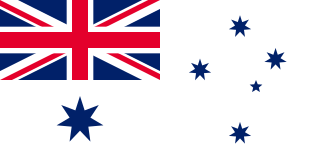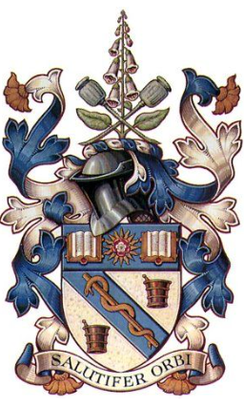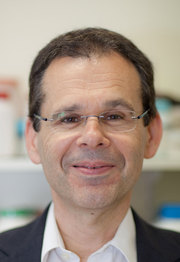
The Royal Australian Navy (RAN) is the naval force of the Australian Defence Force (ADF). The professional head of the RAN is Chief of Navy (CN) Vice Admiral Mark Hammond AM, RAN. CN is also jointly responsible to the Minister of Defence (MINDEF) and the Chief of Defence Force (CDF). The Department of Defence as part of the Australian Public Service administers the ADF.

Pharmacy is the science and practice of discovering, producing, preparing, dispensing, reviewing and monitoring medications, aiming to ensure the safe, effective, and affordable use of medicines. It is a miscellaneous science as it links health sciences with pharmaceutical sciences and natural sciences. The professional practice is becoming more clinically oriented as most of the drugs are now manufactured by pharmaceutical industries. Based on the setting, pharmacy practice is either classified as community or institutional pharmacy. Providing direct patient care in the community of institutional pharmacies is considered clinical pharmacy.

The UCL School of Pharmacy is the pharmacy school of University College London (UCL). The School forms part of UCL's Faculty of Life Sciences and is located in London, United Kingdom.

Cisplatin is a chemical compound with formula cis-[Pt(NH3)2Cl2]. It is a coordination complex of platinum that is used as a chemotherapy medication used to treat a number of cancers. These include testicular cancer, ovarian cancer, cervical cancer, bladder cancer, head and neck cancer, esophageal cancer, lung cancer, mesothelioma, brain tumors and neuroblastoma. It is given by injection into a vein.
The Royal Australian Chemical Institute (RACI) is both the qualifying body in Australia for professional chemists and a learned society promoting the science and practice of chemistry in all its branches. The RACI hosts conferences, seminars and workshops. It is the professional body for chemistry in Australia, with the ability to award the status of Chartered Chemist (CChem) to suitably qualified candidates.

Monash University, Parkville campus is a campus of Monash University, located in Parkville, Victoria, Australia. It is home to the Faculty of Pharmacy and Pharmaceutical Sciences. Founded in 1881 and previously known as the Victorian College of Pharmacy, the faculty is the oldest school of pharmacy in Australia. A major centre of research and teaching, it is internationally regarded for its research in drug target biology and discovery, medicinal chemistry, drug development, formulation science, and medicine use and safety, including the discovery and development of the world's first successful anti-influenza drug, Relenza. In international rankings, it is ranked as the number one school of pharmacy and pharmacology in Australia and number two worldwide.
The Australian Patrol Boat Group is a Force Element Group (FEG) of the Royal Australian Navy. It manages the Navy's patrol boats.

Australia was a member of the international coalition which contributed military forces to the 1991 Gulf War, also known as Operation Desert Storm. More than 1,800 Australian Defence Force (ADF) personnel were deployed to the Persian Gulf from August 1990 to September 1991, while contingents from the Royal Australian Navy circulated through the region in support of the sanctions against Iraq until November 2001. In August 1990, two frigates HMAS Adelaide and HMAS Darwin and the replenishment ship HMAS Success left for the Persian Gulf. HMAS Success had no air defences, so the Army 16th Air Defence Regiment was embarked. On 3 December 1990, HMAS Brisbane and HMAS Sydney (IV) relieved HMAS Adelaide and HMAS Darwin. On 26 January 1991, HMAS Westralia replaced HMAS Success. A Navy clearance diving team was also deployed for explosive ordnance disposal and demolition tasks. Australian ships were in danger of sea mines and possible air attacks. In a number of recorded incidents, HMAS Brisbane encountered free floating mines, on one occasion narrowly avoiding a collision. Both HMA Ships Brisbane and Sydney encountered significant air threat warnings from Iran and Iraq throughout the initial period of the commencement of the Desert Storm Campaign. The detection of land based Silkworm anti-ship missiles from Iran throughout the campaign also added to the challenges for both crews as well as the multi-national Naval Forces.
The Australian Defence Organisation (ADO), also known as simply Defence, is an Australian Government organisation that consists of both the Australian Defence Force (ADF) and the Department of Defence (DoD). The ADO's collective aims are to "defend Australia and its national interests" and "protect and advance Australia's strategic interests".
The Australian Defence Organisation (ADO) is composed of the armed forces of the Commonwealth of Australia, the Australian Defence Force (ADF), and the Australian Public Service government department, the Department of Defence which is composed of a range of civilian support organisations.

Rear Admiral Nigel Stephen Coates, was a senior officer in the Royal Australian Navy.

Captain Trevor Jackson is an Australian technical diver, shipwreck researcher, author and inventor. In 2002 he staged what became known as the "Centaur Dive", which subsequently led to the gazetted position of the sunken Hospital Ship AHS Centaur being questioned. Jackson is the inventor of the 'Sea Tiger' lost diver location system, and an author on the subject of wreck diving.

Picoplatin is a platinum-based antineoplastic agent in clinical development by Poniard Pharmaceuticals for the treatment of patients with solid tumors.
Rosetta Martiniello-Wilks is an Australian cancer researcher. She is a former senior lecturer at the University of Technology Sydney (UTS) in Ultimo, Sydney, Australia. Martiniello-Wilks was a core member of the Centre for Health Technologies at UTS and head of the Translational Cancer Research Group in the School of Medical and Molecular Biosciences, Faculty of Science, UTS.

Tamara Minko is a distinguished professor and chair of the department of pharmaceutics at Rutgers University, Ernest Mario School of Pharmacy. She has an H-index of 43 since 2016 and over 17,800 citations of her work.

Anthony Steven Weiss AM PhD FRSC FTSE FRSN FRACI, FTERM, FBSE is a university researcher, company founder and entrepreneur. He is the leading scientist in human tropoelastin research and synthetic human elastin. He holds the McCaughey Chair in Biochemistry, heads the Charles Perkins Centre Node in Tissue Engineering and Regenerative Medicine, and is Professor of Biochemistry and Molecular Biotechnology at the University of Sydney. His discoveries are on human elastic materials that accelerate the healing and repair of arteries, skin and 3D human tissue components. He is a Fellow of the Royal Society of Chemistry. Weiss is on the editorial boards of the American Chemical Society Biomaterials Science and Engineering, Applied Materials Today (Elsevier), Biomaterials, Biomedical Materials, BioNanoScience (Springer) and Tissue Engineering. He is a biotechnology company founder, promoter of national and international technology development, and has received national and international awards, including the Order of Australia.
The Navy Headquarters is the command responsible for training, personnel, resources, engineering and capability development of the Royal Australian Navy. As such Navy Headquarters works with the Capability Acquisition and Sustainment Group, the Defence Science and Technology Group, and the Joint Capabilities Group to ensure the personal, materiel and logistical capabilities of the Royal Australian Navy.
The Joint Health Command (JHC) is responsible for the delivery of military medicine and joint healthcare services to Australian Defence Force (ADF) personnel, including military psychiatry and rehabilitation services. The JHC is also responsible for providing strategic health policy, the development of the health preparedness of ADF personnel for operations, and the coordination of health units for deployment in support of operations. JHC is led by the dual-hatted Commander Joint Health and Surgeon General of the ADF.
The 2018 Australia Day Honours are appointments to various orders and honours to recognise and reward good works by Australian citizens. The list was announced on 26 January 2018 by the Governor General of Australia, Sir Peter Cosgrove.










